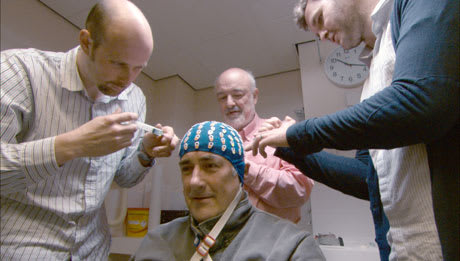For all of the seeming mystery and potential allegory involved in a metaphysical exploration of being struck by lightning, there's nothing particularly surprising, or even very interesting, in Act of God, the documentary about victims' perceptions of this phenomenon. In fact, the film is quite aggravating to watch at times, lingering on moments where there's nothing to reflect on and dwelling on repetitive information.
Using Paul Auster, a man struck by lightning as a teenager, who also happens to be the most articulate of the group, as a framing device, the documentary proceeds to detail the stories of similar happenings around the world, when not examining the brainwaves of Fred Frith, a guitar improviser
Unsurprisingly, the Mexican woman believes that God had something to do with the incident, while the French man believes it to be a transcendental, life-defining moment. And the man from South River, ON is content to take it at face value, when not awkwardly re-enacting it by himself in the woods.
It is all relatable by cultural influence; people interpret an incident based on the signifiers, dominant institutions and social influences around them, which is why the man from Las Vegas came up with elaborate story about the afterlife to construct a cult around. People from his community learn to exploit things for fiscal gain, while a teenager from a middle-class family grows up to interpret the act within the academic vacuum of theology. It's relative but the documentary never really points this out or juxtaposes it with any meaning or examples.
In fact, there seems to be a sense of desperation to make mysterious what really isn't, even in some of the editing, which are intended to keep the audience on edge but realistically, just keeps the film at an annoying distance. This one is strictly for a pretentious crowd unfamiliar with Introductory Cultural Theory.
(Mongrel Media)Using Paul Auster, a man struck by lightning as a teenager, who also happens to be the most articulate of the group, as a framing device, the documentary proceeds to detail the stories of similar happenings around the world, when not examining the brainwaves of Fred Frith, a guitar improviser
Unsurprisingly, the Mexican woman believes that God had something to do with the incident, while the French man believes it to be a transcendental, life-defining moment. And the man from South River, ON is content to take it at face value, when not awkwardly re-enacting it by himself in the woods.
It is all relatable by cultural influence; people interpret an incident based on the signifiers, dominant institutions and social influences around them, which is why the man from Las Vegas came up with elaborate story about the afterlife to construct a cult around. People from his community learn to exploit things for fiscal gain, while a teenager from a middle-class family grows up to interpret the act within the academic vacuum of theology. It's relative but the documentary never really points this out or juxtaposes it with any meaning or examples.
In fact, there seems to be a sense of desperation to make mysterious what really isn't, even in some of the editing, which are intended to keep the audience on edge but realistically, just keeps the film at an annoying distance. This one is strictly for a pretentious crowd unfamiliar with Introductory Cultural Theory.
